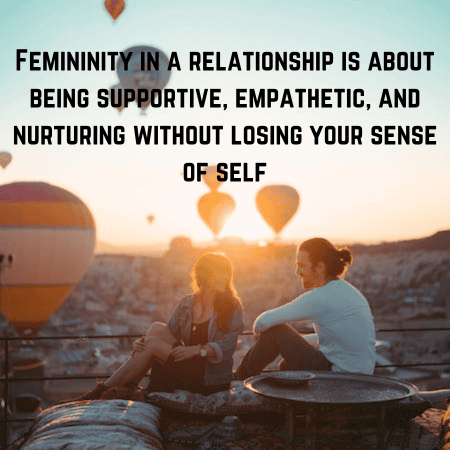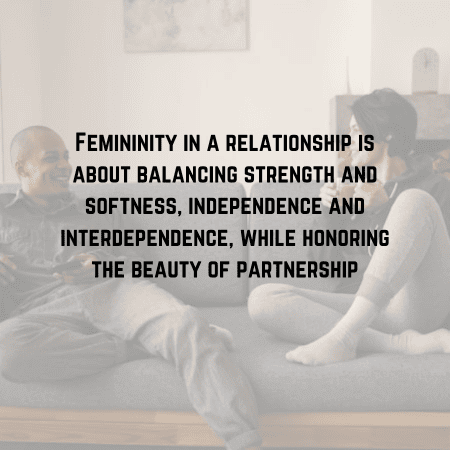Femininity in a relationship is about blending sensitivity with strength, creating a supportive and loving environment for both partners. It involves cultivating qualities like kindness, patience, and understanding, which are vital for a harmonious relationship. By embracing a feminine approach, you can open up new avenues of connection that foster mutual respect and affection.
How to Be More Feminine in a Relationship
Femininity encompasses various qualities and behaviors traditionally associated with women, but it’s important to note that anyone can embrace these traits. Culturally, it may vary greatly, but Femininity often involves empathy, nurturing, and expressiveness. In this article, we will discuss How to Be More Feminine in a Relationship. So keep on reading…

The Role of Communication
Effective communication plays a crucial role in enhancing feminine presence in relationships by fostering a deeper emotional connection and creating a nurturing environment. When communication is open, honest, and empathetic, it allows for a clearer expression of feminine qualities such as understanding, sensitivity, and compassion.
Expressiveness:
Femininity often involves a high degree of expressiveness. Communicating your feelings and thoughts openly and with emotional depth can enhance your feminine presence by showing vulnerability and authenticity. This not only strengthens the bond but also invites openness from your partner.
Tone and Body Language:
The way you communicate can also reflect Femininity. A soft, gentle tone and open body language can convey warmth and caring, often associated with Femininity. This helps to create a comforting and safe space for emotional exchanges.
Active Listening:
Listening is as important as speaking. Showing genuine interest in your partner’s words, acknowledging their feelings, and responding thoughtfully can demonstrate empathy and understanding. Active listening reinforces feminine traits of nurturing and empathy, making your partner feel valued and supported.
Conflict Resolution:
Approaching conflicts with a focus on resolution and harmony, rather than confrontation, embodies feminine qualities of peace-making and cooperation. Communicating in a way that seeks to understand first and then to be understood can prevent misunderstandings and build trust.
Encouragement and Affirmation:
Positive reinforcement through words of affirmation and encouragement strongly reflects feminine energy. By uplifting your partner and recognizing their efforts and strengths, you reinforce a supportive dynamic central to feminine presence.

Supporting Your Partner To Nourish Femininity
Supporting your partner in a relationship can manifest feminine qualities in several impactful ways. Femininity, often associated with nurturing, empathy, and sensitivity, finds a direct expression through supportive actions. Here’s how supporting your partner can enhance these qualities:
Nurturing Growth: Supporting your partner’s personal and professional growth is a profound way of showing care and love, qualities deeply rooted in femininity. This might involve encouraging them to pursue their interests or career ambitions, or simply being there to discuss ideas and dreams. Such support not only fosters their development but also strengthens the bond between you, reflecting the nurturing aspect of femininity.
Emotional Support: One of the hallmarks of femininity is emotional depth and the ability to empathize. By providing a listening ear and a shoulder to lean on during tough times, you embody these feminine traits. Emotional support includes validating your partner’s feelings, offering comfort, and sometimes just being present without offering solutions, which can make them feel understood and valued.
Practical Help: Femininity can also be expressed through acts of service, another form of support. Helping out with daily tasks, managing responsibilities together, or stepping in when your partner is overwhelmed, are all ways to practically support your partner. These actions not only ease their burden but also demonstrate a commitment to shared life and responsibilities, a key aspect of caring in feminine terms.
Maintaining Femininity and Independence
Femininity is often associated with empathy, nurturing, and sensitivity, though it’s important to recognize that Femininity can manifest differently for everyone. Independence is typically defined as being self-sufficient and making decisions autonomously. These qualities aren’t mutually exclusive; they can complement each other in powerful ways.
Self-understanding: Knowing yourself deeply is the first step towards balancing your identity. Understand what Femininity and independence mean to you, not just what society expects them to mean.
Rejecting Stereotypes: Challenge the traditional stereotypes that suggest Femininity is synonymous with weakness or that independence is inherently unemotional. Embrace the idea that you can be both nurturing and self-reliant.
Setting Boundaries: Independence often involves setting and maintaining clear boundaries, which is also a way to express and protect your feminine energy. Knowing when and how to say no can be as much a reflection of your strength as your ability to support others.
Pursuing Passions and Goals: Whether your interests are traditionally feminine or not, pursuing them vigorously is a testament to your individuality and autonomy.
Relationship Dynamics: In relationships, strive for a balance where you can be caring and supportive (qualities often aligned with Femininity) while being firm about your freedoms and choices.
In practice, balancing these aspects can affect various areas of life, from career choices and personal relationships to self-expression and emotional well-being.
It involves continually negotiating with the external pressures that try to define what femininity and independence should look like, making it a dynamic and ongoing process.
Ultimately, the balance between femininity and independence is deeply personal and can be a source of great strength. It’s about allowing yourself to define and express these aspects on your terms.

The importance of having personal aspirations
Personal goals are essential for ensuring an active and balanced life. This principle is also applicable to relationships. Goals for personal development allow people to become more independent, essential to maintaining a healthy, dynamic relationship. This is why goals for personal growth are crucial and how to pursue them while fostering a healthy relationship.
Self-Development:
Personal goals usually focus on personal improvement, whether it’s acquiring new skills or advancing a career or engaging in passions and hobbies. When they set and achieve these goals, people can improve their lives, and also bring new energy and experience to their relationships. The constant growth of a relationship can keep relationships lively and thrilling.
Autonomy and Confidence:
Personal goals benefit keep oneself in the relationship. They allow people to pursue activities outside of their relationship that are important to their the self-esteem and identity of each person. The achievement of these goals increases confidence and self-confidence, which are desirable and valuable traits in the romantic relationship.
Emotional Well-Being:
The pursuit of personal goals can contribute to overall well-being and emotional wellbeing through a sense of achievement and purpose. This is crucial because emotional health is directly related to the quality of relationships. If people are content and content, they’re more likely to make positive contributions to their relationships.
Inspiration to Partner:
When one person is active in pursuing and succeeds in achieving their own goals, it could encourage the other. This can inspire both of them to achieve their own goals and create a an environment of support that encourages each one’s progress and accomplishment.
Individuality in Relationships
In relationships, individuality refers to the capacity to preserve your own personal identity, interests and values even while in a relationship. This balance is vital to the longevity and health for any type of partnership, be it romantic or platonic. This is why it’s important to be unique and how to foster it in relationships:
Find your personal interests Take part in activities and pursuits you enjoy regardless of your spouse. It enriches your life and helps you stay close to your individual passions and tastes.
Set your own goals As we’ve discussed before Personal goals are crucial to self-development. Set goals that will challenge as well as excite you, then follow them with determination. The goals you set can be linked to your career or personal skills or your interests.
Do nothing but be alone The need for solitude is crucial to self-reflection and recharge. Make sure you set aside Time to yourself on a regular basis. Utilize this time to do activities that you like, meditate or relax and consider.
Keep Separate friendships Although having friendships with your partner is great but having your own group of close friends is essential. These friendships favor extra psychological support as well as social networks that are not tied to your relationship with your partner.
Let Your Opinions Be Heard Let your voice be heard and freely share your thoughts and views within the context of your relationship. Healthy relationships are based on respect and mutual trust, which means that both parties respect their own opinions even if they disagree.
Maintaining your individuality in a relationship can create more harmonious relationships that allows both partners to grow both individually and collectively. It helps build a relationship that is based on respect and admiration for one another as separate individuals with their own unique characteristics and views.
Conclusion
Enhancing femininity in a relationship is about more than adhering to traditional gender roles; it’s about cultivating a set of interpersonal skills and qualities that foster understanding, affection, and respect. By focusing on communication, emotional expressiveness, support, and personal integrity, you can enrich both your relationship and personal growth. Embrace these elements with authenticity and confidence to nurture a loving and balanced relationship.